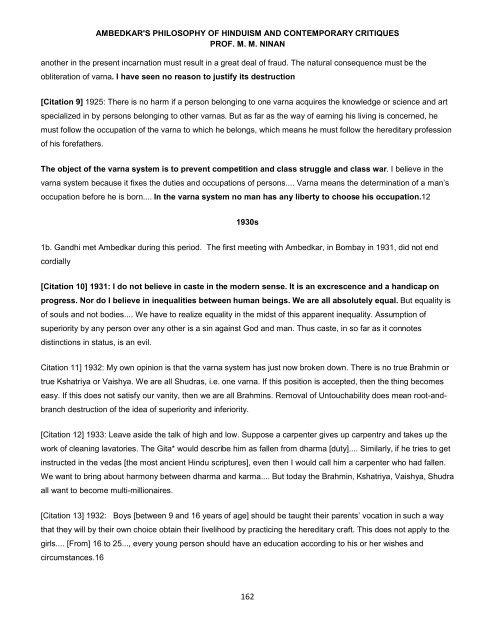Ambedkar-Philosophy of Hinduism
Create successful ePaper yourself
Turn your PDF publications into a flip-book with our unique Google optimized e-Paper software.
AMBEDKAR'S PHILOSOPHY OF HINDUISM AND CONTEMPORARY CRITIQUES<br />
PROF. M. M. NINAN<br />
another in the present incarnation must result in a great deal <strong>of</strong> fraud. The natural consequence must be the<br />
obliteration <strong>of</strong> varna. I have seen no reason to justify its destruction<br />
[Citation 9] 1925: There is no harm if a person belonging to one varna acquires the knowledge or science and art<br />
specialized in by persons belonging to other varnas. But as far as the way <strong>of</strong> earning his living is concerned, he<br />
must follow the occupation <strong>of</strong> the varna to which he belongs, which means he must follow the hereditary pr<strong>of</strong>ession<br />
<strong>of</strong> his forefathers.<br />
The object <strong>of</strong> the varna system is to prevent competition and class struggle and class war. I believe in the<br />
varna system because it fixes the duties and occupations <strong>of</strong> persons.... Varna means the determination <strong>of</strong> a man’s<br />
occupation before he is born.... In the varna system no man has any liberty to choose his occupation.12<br />
1930s<br />
1b. Gandhi met <strong>Ambedkar</strong> during this period. The first meeting with <strong>Ambedkar</strong>, in Bombay in 1931, did not end<br />
cordially<br />
[Citation 10] 1931: I do not believe in caste in the modern sense. It is an excrescence and a handicap on<br />
progress. Nor do I believe in inequalities between human beings. We are all absolutely equal. But equality is<br />
<strong>of</strong> souls and not bodies.... We have to realize equality in the midst <strong>of</strong> this apparent inequality. Assumption <strong>of</strong><br />
superiority by any person over any other is a sin against God and man. Thus caste, in so far as it connotes<br />
distinctions in status, is an evil.<br />
Citation 11] 1932: My own opinion is that the varna system has just now broken down. There is no true Brahmin or<br />
true Kshatriya or Vaishya. We are all Shudras, i.e. one varna. If this position is accepted, then the thing becomes<br />
easy. If this does not satisfy our vanity, then we are all Brahmins. Removal <strong>of</strong> Untouchability does mean root-andbranch<br />
destruction <strong>of</strong> the idea <strong>of</strong> superiority and inferiority.<br />
[Citation 12] 1933: Leave aside the talk <strong>of</strong> high and low. Suppose a carpenter gives up carpentry and takes up the<br />
work <strong>of</strong> cleaning lavatories. The Gita* would describe him as fallen from dharma [duty].... Similarly, if he tries to get<br />
instructed in the vedas [the most ancient Hindu scriptures], even then I would call him a carpenter who had fallen.<br />
We want to bring about harmony between dharma and karma.... But today the Brahmin, Kshatriya, Vaishya, Shudra<br />
all want to become multi-millionaires.<br />
[Citation 13] 1932: Boys [between 9 and 16 years <strong>of</strong> age] should be taught their parents’ vocation in such a way<br />
that they will by their own choice obtain their livelihood by practicing the hereditary craft. This does not apply to the<br />
girls.... [From] 16 to 25..., every young person should have an education according to his or her wishes and<br />
circumstances.16<br />
162


















